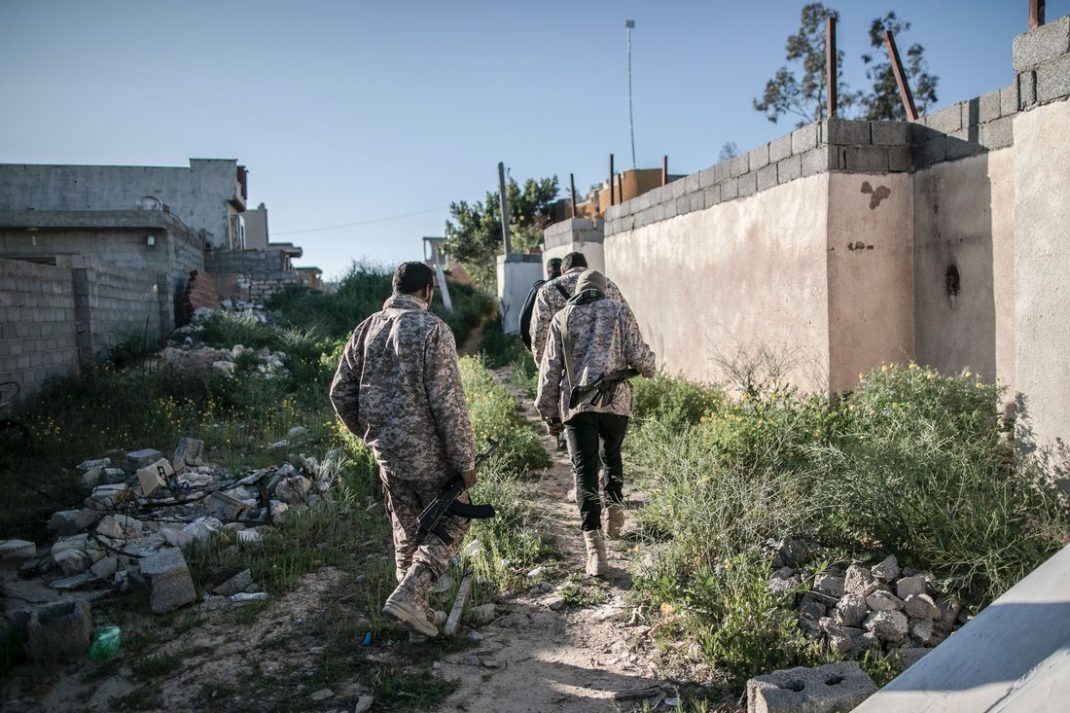Community Dynamics and Economic Interests
By Tim Eaton, Abdul Rahman Alageli, Emadeddin Badi, Mohamed Eljarh, and Valerie Stocker
 This paper is based on approximately 200 interviews carried out by the authors – in person and remotely – with a wide range of Libyan actors between November 2018 and September 2019. This the paper does not claim to cover all armed groups in the country.
This paper is based on approximately 200 interviews carried out by the authors – in person and remotely – with a wide range of Libyan actors between November 2018 and September 2019. This the paper does not claim to cover all armed groups in the country.
(11)
Access to state resources
The ability of southern-based armed groups to obtain resources from the central state is more uneven than for their counterparts in the west and east of the country.
Security sector salaries
As Gaddafi-era military structures fell apart in 2011, many southern army members lost their access to salaries. Over subsequent years, salaries were gradually unlocked, on an individual basis or in batches. Some pre-2011 military units remained under the chief of staff, but in most cases army members needed to re-enrol.
As the process was often managed through informal connections, this fostered the emergence of clientelist structures. The polarization of national-level governance led rival camps to use the release of salaries for political gain, especially from 2014 onwards.
For example, the (now-defunct) Government of National Salvation would place lists of Tuareg army members back on to the payroll to obtain the loyalty of local leaders. The same tactics were employed by the Interim Government and by the LAAF.
Meanwhile, a large number of civilian fighters were included on the public payroll as the armed groups to which they belonged obtained government recognition and mandates. Security sector contracts gave rise to corruption as there was little state control over the registration and revenue distribution processes:
‘Bribes would be paid to interior or defence ministry officials to include certain lists, or intermediaries who helped register the brigade members would receive a share of the salary payments.’ In many instances, armed group members accused their commanders of embezzling state funds destined for salary payments. Such arrangements reportedly continue to affect salary levels in the Fezzan to this day.
The usual salary for a member of a government-approved armed group is now around LYD1,500–2,000 per month (in 2012 and 2013 most were only paid LYD500). Those on ‘fake’ lists do not receive full pay, because a share of it is diverted to the interlocutor(s) who facilitated the arrangement. ‘For a young man in Sebha with poor work prospects it’s still preferable to get, say, LYD250 per month than nothing.’
This mechanism has boosted the ranks of armed groups in the Fezzan, but it has also artificially inflated membership numbers, since many of those enlisted are inactive. Over the years, salary payments have not kept up with the proliferation of armed groups and the level of recruitment in the Fezzan. This has left many fighters without steady income, reliant on additional sources of revenue through their group’s territorial and tribal influence.
Budget cuts and the introduction of the national ID number system in 2013 had a major impact in the Fezzan, especially in Sebha and Ubari. Population groups of undetermined legal status who were excluded from the database are also strongly represented in the security sector. Many were regular members of the army and police under the former regime, and later became involved in armed groups that sprung up after 2011.
The reform thus left a large number of combatants without pay. According to a former police officer from Ubari: Many army members from the Sahelian Tuareg left their positions after the national [ID] number was implemented and they stopped getting paid.
Battalions ended up with 50 or less members on active duty, and hundreds sitting at home with no revenue. Some ex-army and police became involved in smuggling and robberies, made a living with menial jobs, or left Ubari to find informal work elsewhere.
An administrative number system – introduced in 2014 for state employees who were ineligible for the national ID number – led to salaries being partially restored, yet disbursements continued to suffer from delays and administrative bottlenecks. The frustrations of southern army personnel about having their ranks and salaries frozen aided the LAAF’s subsequent expansion into the region.
It was not until mid-2019 that the GNA took decisive measures to address these issues, but its response was widely seen as being too little, too late. It authorized Ali Kanna, as commander of Sebha Military Zone, to make an inventory of military members in the region who had not been getting paid, and to adjust their ranks and salaries based on the aforementioned Decree 441 of 2013.
Kanna issued two key decrees to settle these issues, in August and October 2019, which included an annex listing over 2,000 rank-and-file military personnel registered in the zone. An interviewee from Ubari welcomed this long-overdue step, but cautioned that the GNA would be unable to take significant credit for it among the Tuareg community.
Salary disbursements in any event remain arbitrary, reliant on unpredictable security arrangements, and seemingly based on outdated personnel lists. As a political instrument for shoring up alliances, the policy on salaries is thus flawed. Salaries for military members are paid from the General Administration for Military Accounts (GAMA) in Tripoli or from the LAAF’s military accounts department, with contractual payments from the Ministry of Defence being made to armed group commanders based on their membership lists.
Money for salaries is allocated to commercial banks, which in turn distribute the funds to their branches depending on where the recipients’ accounts are located. Although salary disbursements in recent years have frequently been delayed by logistical problems, the situation has improved since the LAAF asserted its authority in Sebha in January 2019.
Throughout 2019 there were regular deliveries of cash from both the CBL in Tripoli and the eastern CBL. 132 The disbursement of security sector salaries to the Fezzan has thus become more reliable. However, the existence of tw chaos. The Tripoli war has led the GNA to try to block salary payments to pro-LAAF groups.
As a result of cash being delivered from the east, some army personnel in the Fezzan may have received duplicate salaries during the first months of 2019 or LAAF war bonuses on top of their GNA-approved salaries. The GNA thus instructed the GAMA’s southern branch and Ali Kanna’s Sebha Military Zone to review the database of army personnel units and to block the salaries of those paid from the east, according to official correspondence dated July 2019.
In order to receive their salaries and wartime bonuses through the GAMA, army members are allegedly required to confirm in writing that they are not ‘communicating with Operation Dignity [LAAF general command] nor will accept any future payments from it’. It is unclear to what extent these measures have been implemented.
While the evident administrative confusion resulting from the institutional divide between east and west renders it difficult to trace payments and assess which groups in the south are currently paid by whom, what partial information is available indicates that commanders have been taking advantage of multiple financial channels.
For example, the GNA has authorized salary and war bonus payments to some groups aligned with the LAAF. According to different explanations put forth by interviewees, this is either because the GNA has not yet fully implemented steps to suspend payments to these groups, because groups are split into pro-GNA and pro-LAAF factions, or because pro-GNA commanders are pretending to have more men under their command than they really do.
As one interviewee in Sebha said: The vast majority of military cadres in the Fezzan support the LAAF. There are a few commanders here and there who will tell the GNA that they, and however many of their soldiers, support it. So the GNA releases pay for them. They will happily receive pay but at the same time might receive pay from the east. They may be present in a in the pocket’.
Control of public facilities
One major avenue for armed groups to access state resources is through physical control of critical infrastructure, both military and civilian. Oil and gas facilities are of particular value because they give local armed actors and communities leverage over the government.
The Sharara, al-Fil and Wafa oil and gas fields were among the first locations in the Fezzan to be seized by anti-regime fighters in 2011. Although the fields are nominally under the authority of the NOC and the Ministry of Defence’s Petroleum Facilities Guard (PFG), they are effectively guarded by local armed groups. As a result, oil facilities have been the object of fierce competition between rival groups.
When groups are unable to obtain state recognition, or their salaries do not materialize, they can become a liability. Multiple production shutdowns at the southern oil fields have illustrated this. Armed groups also exploit their leverage over other public facilities. For example, Sebha’s Court of First Instance was briefly shut down by the armed group that claimed to guard the building, after it had failed to obtain state recognition and salaries.
By demonstrating their ability to disrupt vital state facilities, armed groups are often able to obtain government concessions. Such blackmail can involve a broader range of local actors and social demands. Refineries and fuel storage sites offer an additional source of ready income for armed groups that oil fields do not. In the southeast, the Martyr Ahmed al-Sharif Battalion (Battalion 306) guards the Sarir refinery and oil depot, where by all accounts it is heavily implicated in fuel smuggling.
In the Fezzan, the Sebha oil depot is an especially lucrative asset for any armed group guarding it, as a substantial amount of the fuel there is sold on the black market, in exchange for bribes to employees and guards. Battalion 160, which had previously guarded the facility for years on government mandates, is widely considered to have enabled illegal fuel sales.
Confronted with popular outrage, the battalion has tried to polish its image by publicizing its anti-smuggling interventions; it even set up a so-called Committee to Combat Fuel Smuggling in 2017. When the LAAF claimed control of Sebha in January 2019, Battalion 160 was removed from the depot and replaced with Battalion 116, which has stronger ties to the LAAF.
Smuggling did not stop, however, and even Battalion 160 allegedly still profiteers through ‘ghost’ fuel stations run by members of the group. Fezzan smuggling practices and networks overall do not appear to have been significantly affected by the LAAF’s campaign in the south, notwithstanding fuel shortages associated with the conflict in western Libya since April 2019.
A Qatrun fuel smuggler interviewed in late March 2019 said that for him little had changed: ‘Yes, we now need to deal with new actors. But [in fact] they are the same old actors, except they now wear the uniforms of Haftar’s army …’ ‘Yes, we now need to deal with new actors. But [in fact] they are the same old actors, except they now wear the uniforms of Haftar’s army …’
***
About the Authors:
Tim Eaton is a senior research fellow with the MENA Programme at Chatham House, where he focuses on the political economy of the Libyan conflict. Tim previously worked for BBC Media Action, the BBC’s international development charity, on projects in Iraq, Egypt, Tunisia and Libya, and helped to set up and manage its Libya bureau from 2013 to 2014.
Abdul Rahman Alageli is an associate fellow with the Middle East and North Africa Programme, based in Tripoli, Libya. He is currently an adviser to the GNA Chief-of-General Staff of the Libyan Army. Abdul Rahman previously worked with the stabilization team of the Libyan Prime Minister’s Office in 2011 before becoming the national security file coordinator in the Office of the Libyan Prime Minister and a member of the Libyan government’s National Security Coordination Team until 2015.
Emadeddin Badi is a researcher and political analyst who focuses on governance, conflict and the political economy of Libya. He has worked with multiple international development organizations and business risk firms as a consultant, and his analysis has been published widely.
Mohamed Eljarh is a Libyan affairs specialist who has covered Libya’s developments since 2011. He is the co-founder and CEO of Libya Outlook, and he acts as the regional manager for CRCM North Africa in Libya. Previously, Eljarh worked with the Atlantic Council and Foreign Policy magazine.
Valerie Stocker is a researcher who has studied Libyan politics and society extensively, mostly focusing on the southern region. She has worked with various development organizations since 2013, conducting fieldwork and analysis on conflict dynamics, peace processes, migration and other subjects. Valerie was based in Tripoli for several years starting in 2008, and has previously worked as a freelance journalist and business risk consultant.
_______________





